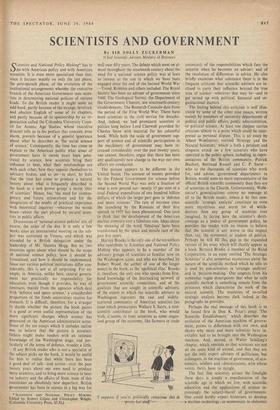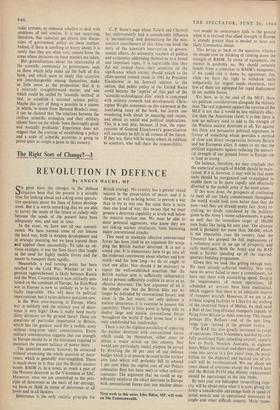SCIENTISTS AND GOVERNMENT
By SIR SOLLY ZUCKERMAN (Chief Scientific Adviser, Ministry of Defence)
Clcientists and National Policy Making* has to ki do with American policy and with American scientists. It is even more specialised than that, since it focuses mainly on only the last phase, the post-sputnik phase, of the evolution of the institutional arrangements whereby the executive branch of the American Government uses scien- tists in determining national policies of various kinds. To the British reader it might seem an odd book, partly because of the strange, involved, and obscure English of some of its chapters, and partly because of its sponsorship by an or- ganisation called the Columbia University Coun- cil for Atomic Age Studies, whose executive director tells us in his preface that concern, even alarm, prevails because of a general ignorance about what he describes as 'the social science of science.' Consequently, the time has come to explain to the American public what areas of government have in cadent years been pene- trated by science, how scientists bring their influence to bear, what their relationships are with each other,. how they appoint themselves to advisory bodies, and so on—in short, he feels that the time has come to produce a natural history about what is frequently described in the book as a new power group, a secret 'elite of scientists.' Hence, 'too, 'the need for contem- porary and future orientations and for the integration of the results of practical experience with theoretical inquiries'—whatever the words mean—about the part played by natural scien- tists in public affairs.
Discussions of 'national science policies' are, of course, the order of the day. It is only a few weeks since an international meeting on the sub- ject was convened in Vienna, and which was attended by a British delegation under the leadership of Mr. Quintin Hogg. But no two countries agree about what should be the scope of national science policy; how it should be formulated, and how it should be implemented. Since our various political institutions differ con- siderably, this is not at all surprising. For ex- ample, in America, unlike here, central govern- ment has practically no responsibility for education, even though it provides, by way of contracts, Mainly from the agencies which deal with 'defence and space science,' a considerable proportion of the funds universities receive for research. It is difficult, therefore, for a stranger to decide whether the picture the book paints is a good or even useful representation of the more significant changes which science has generated on the American administrative scene. Some of the ten essays which it includes incline one to believe that the picture is accurate. Others might make readers with an intimate knowledge of the Washington stage, and par- ticularly of the arena of defence, wonder a little.
If any British reader who is not a specialist of the subject picks up the book, it would be useful for him to realise that while there has been a good deal of talk—and action—over the past twenty years about our own need to produce more scientists, and to bring more science to bear on industry and the affairs of State, none of this constitutes an absolutely new departure. British government has been in science in a big way for
* SCIENTISTS AND NATIONAL POLICY MAKING. ,r Edited by Robert Gilpin and Christopher Wright. ' suPP6)" it
(Columbia University Press, $7.50.) well over fifty years. The debate which went on al- most throughout the nineteenth century about the need for a national science policy was at least as intense as the one in which we have been engaged since the end of the Second World War —Trend, Robbins and others included. The Royal Society has been an adviser of government since 1660. The Geological Survey, the Department of the Government Chemist, are nineteenth-century 'establishments. The Research Councils date from the period of the First World War. There have been scientists in the civil service for decades. And, indeed, we had prominent scientists in politics long before Lord Cherwell provided Sir Charles Snow with material for his colourful book. While both the scale of government sup- port of science and of scientific participation in the machinery of government may have in- creased considerably over the past twenty years, one cannot, therefore, argue that there has been any qualitatively new change in the way our own affairs are conducted.
The picture appears to be different in the United States. The amount of money provided by the Federal Government for science before the Second World War was only a fraction of what is now poured out—nearly 15 per cent of a total Federal expenditure of one hundred billion dollars, of which the larger part goes to 'defence and space sciences.' The rate of increase since the launching by the Russians of their first sputnik in 1957 has been phenomenal. One used to think that the-development of the American nuclear armoury cost a fabulous sum. Ideas about the meaning of the word 'fabulous' have been transformed by the space and missile race of the past five years.
Harvey Brooks is the only one of the ten authors who contribute to Scientists and National Policy Making who appears to be a member of the advisory groups of scientists so familiar now on the Washington scene, and who are described by Robert Wood, the author of one of the longer essays in the book, as the 'apolitical Me.' Brooks is, therefore, the only one who speaks from first- hand knowledge of the interlocking network of government scientific committees, and of the qualities that are sought in scientific advisers; of the extent to which the scientific advisers in Washington represent the vast and widely- scattered community of American scientists (an issue which preoccupies Wallace S. Sayre, a non- scientist contributor to the book, who would wish, it seems, to treat scientists as some organ- ised group of the economy, like farmers or trade
you're politically conscious this is pretty hot stall: unionists); of the responsibilities which face the scientist when he becomes an adviser; and of the resolution of differences in advice. He also briefly examines what substance there is in the frequent criticism that scientific advisers are in- clined to carry their influence beyond the true area of science—wherever that may be—and to get mixed up with political, financial and or- ganisational matters.
The feeling behind this criticism is well illus- trated by some of the other nine essays, written mainly by members of university departments of politics and public affairs, public administration, or political science. At least one chapter carries criticism almost to a point which could be inter- preted as personal dispute. This is an essay by Albert Wohlstetter, entitled 'Strategy and the Natural ScientiSts,' which is both a petulant and eloquent attack on a few scientists who have operated in the public sphere, including, as repre- sentatives of the British community, Patrick
Blackett, Bertrand Russell and C. P. Snow— who to the thousands of scientists who work
for, and advise, government departments in Britain, would seem no more representative of the official British scientific community than they-are of scientists in the Church., Unfortunately, Wohl- stetter's generalisations convey no message at all to the British reader, unless it be that non- scientific 'strategic 'analysts' constitute an even more mysterious and secret lot of witch- doctors than any group of scientists ever imagined. In laying bare the scientist's short- comings as a maker of government policy, he provides the reader with no reason to believe that the scientist is any worse in this respect than, say, the economist or student of politics. Perhaps he will fill this gap in the expanded version of his essay which will shortly appear as a book. Bernard Brodie, a member of the Rand Corporation, in an essay entitled 'The Strategic Scientists' is also somewhat mysterious about the nature of the scientific method which he tells us is used by non-scientists in 'strategic analyses' and in `decision-making.' One suspects from his somewhat vague descriptions that what he calls scientific method is something remote from the processes which characterise the work of the natural scientist. The mysteries of so-called strategic analysis become dark indeed in the paragraphs he provides.
Perhaps the Teal message of this book is to be found first in Don K. Price's essay The Scientific Establishment,' which describes the evolution of the American machine of govern- ment, points to differences with our own, and shows why more and more scientists have in- , evitably had to be brought into the Washington machine. And, second, in Walter Schilling's chapter, which reminds us that scientists are not all the same kind of animal, and that they are not the only expert advisers of politicians, but colleagues, in the machine of government, of eco- nomists, soldiers and r.dministrators, with whose voices theirs have to mingle.
The fact that scientists attract the limelight these days is simply a manifestation of the scientific age in which we live, with scientific education and the applications of science in- creasingly the subject-matter of governments. One could hardly expect historians to develop , a nuclear technology, or •economists to elaborate radar systems, or romance scholars to deal with problems of soil erosion. It is not surprising, therefore, that scientists get drawn into discus- sions of government polity on these matters. Indeed, if there is anything to worry about, it is surely that they are often very remote from the areas where decisions on these matters are taken.
But generalisations about the relationship of the scientific community to government, such as those which help make up the bulk of this book, and which seem to imply that scientists are interchangeable among themselves, make as little sense as the proposition that it is a relatively straightforward matter, and one which could be settled by 'scientific method' at that, to establish a national science policy. Maybe this sort of thing is possible in a system in which, to quote from Bernard Brodie's essay, it can be claimed that 'the relations between the civilian scientific strategists and their military clients' have on the whole 'been thoroughly good and mutually profitable.' Experience does not suggest that the exercise of establishing a policy and a scale of scientific priorities is going to prove quite as simple a game in this country. C. P. Snow's saga about Tizard and Cherwell has unfortunately had a considerable influence in 'personalising' and dramatising for the non- scientist contributors of this American book the story of the scientist's intervention in govern- mental affairs. As university teachers of politics and economics addressing themselves to a broad and important topic, it is regrettable that they did not instead focus their attention on the significance which society should attach to the often-quoted remark made in 1961 by President Eisenhower in his farewell address to the nation, that public policy in the United States' could become the 'captive' of that part of the 'scientific-technological elite' which is concerned with military research and development. Chris- topher Wright comments on this statement in the concluding essay of the book, but leaves one wondering both about its meaning and causes, and about its social and political implications. This is a real pity, because, if true, the reper- cussions of General Eisenhower's generalisation will inevitably be felt in all corners of the future. If they are, there will be many others, in addition to scientists, who will share the responsibility.



































 Previous page
Previous page